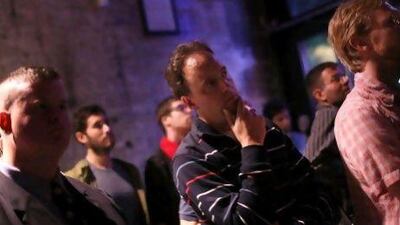NEW YORK // In 2008, when the United States elected its first African-American president, Mo's Bar was at the centre of the ecstatic celebrations in Fort Greene, the historic section of Brooklyn known for its black heritage.
On Wednesday night, Mo's was again overflowing with an ethnically diverse crowd of young Brooklynites who had come to watch President Obama spar with his Republican rival Mitt Romney in the first presidential election debate of 2012, and perhaps once again catch the infectious spirit of 2008. But after four years of recession that has disproportionately affected young people and African Americans, inspiration was difficult to come by.
The view from Mo's on that November night in 2008 was of thousands of the neighbourhood's residents - African Americans along with the young white professionals who had recently gentrified the area - filling the leafy, brownstone-lined avenue together, drumming, dancing, and chanting: "Yes we can! Yes we can!" Cary Graber, a white Brooklyn native, was 28 years old at the time. When the election result tipped inevitably in Barack Obama's favour she came with a group of friends to Mo's, a traditionally black bar, to soak up the momentous night. "Mo's has been here since before Fort Greene became what it is now," she said. "To be honest, I wanted to be around black people, I wanted to witness history."
When Ms Graber arrived, Mo's was over capacity and she and her friends watched Mr Obama on televisions set up on the sidewalk. "It was so moving, everything broke down, people were embracing everyone near them," she recalled. "I saw people who'd probably never voted before, 'thugs' as they would be described, crying."
"It wasn't just because he was black, but because he was young - this was someone we had all elected," she said.
Conversations among the 300 or so patrons ended as the screens above the bar and beneath a back wall covered in soul and hip-hop vinyl record covers showed the president striding towards his lectern. As Mr Obama began to speak, the bar's sound system died, and whistles and boos filled the room. "They're trying to shut down Obama!" someone yelled.
But that was the most raucous moment of the night. Mostly, people watched and listened intently to both candidates, with partisan cheers for Mr Obama or jeers directed at Mr Romney punctuating the debate, but also with genuine interest in both candidates' positions.
"I'm looking for clarity," said Justo Scott, 27, a nattily dressed corporate recruiter who voted for Mr Obama in 2008 and plans to vote for him again. "There's been lots of general stuff from both camps, but I want to know what they as individuals are going to do."
As Mr Romney spoke about his support for small businesses, Kia Evans, 31, a rare black Republican - and Obama supporter - stood outside on the sidewalk watching and shaking her head. "He says one thing, but when he was with Bane [investment firm] he was destroying small businesses," she said.
"But am I happy with how Obama has operated?" she added. "Not at all."
Ms Evans, grew up in Fort Greene but moved farther east to Bedford-Stuyvesant, another Brooklyn neighbourhood, two years ago because she could no longer afford her rent. She came to Mo's to watch the debates because she too was here in 2008 on that transcendent election night. This year, however, Ms Evans may not vote, a troubling sign for an Obama campaign that is relying on the same levels of support from minority voters.
"Within the last year I have felt very disillusioned, to the point where I wake up in the morning and think, 'will I vote? I don't know'," she said.
A jeep blasting reggae pulled up to the kerb in front of Mo's and Tiffany, who had been listening intently from the sidewalk, gestured at the driver to turn down the volume.
"It's a very good debate," she said to him. He obliged and got out to watch.
Tiffany, who only wanted to give her first name, is a 28-year-old biology student who recently moved from Fort Greene to east Brooklyn. She plans to vote for Mr Obama, but she says that many African Americans in her neighbourhood are less invigorated about the president than they once were.
"People are losing their jobs, losing their homes, tuition is high, public schools are being shut down ... Obama has great ideas but I'm not impressed because at the local level there is failure," she said.
After cheering Mr Obama's closing remarks, the debate watchers streamed out of Mo's into the unseasonably warm Brooklyn night. "In 2008 it was dramatic," said Rosalba Strada, a 33-year-old freelance accountant. "This time it feels like a comedy show."

